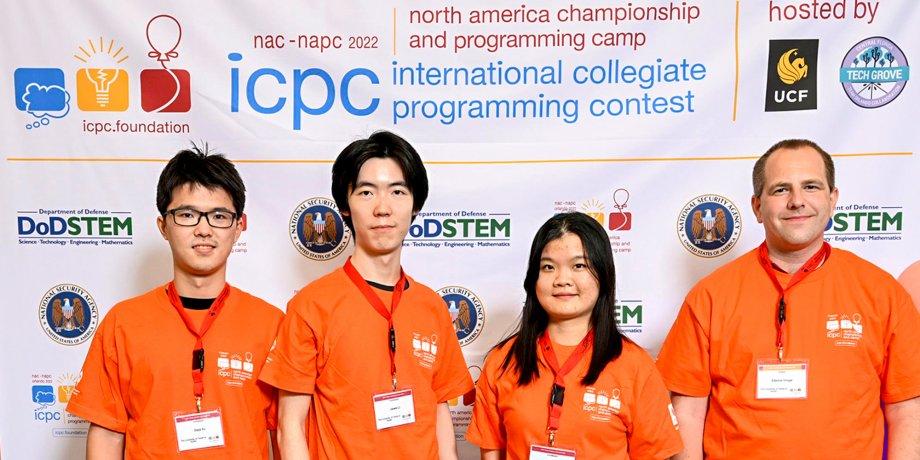
On Mon, 30 May 2022, the UT Programming Team competed in the ICPC North America Championship (NAC) in Orlando, FL, hosted by the University of Central Florida.
The competition consisted of 50 teams of 3 students from 50 schools across the US and Canada. UT Austin solved 6 of the 13 problems and came in 13th.
The three students are Dejia Xu (ECE Ph.D. student), Jiawei Li (CS Ph.D. student), and Ruoshi Dai (CS MS student), and they will compete again at the ICPC World Finals in Sharm el-Sheikh, Egypt in Nov 2023.
UT has been competing in ICPC since 1997. In the last six years, Egypt will be UT's fifth appearance at the world finals. UT went to the 2019 world finals in Moscow, the 2018 world finals in Portugal, the 2017 world finals in Beijing, and the 2016 world finals in South Dakota. They also advanced five additional times between 1997 and 2009.
UT has seen marked improvement since the creation of a new elective, CS104c: Competitive Programming in 2014, taught by the faculty coaches Etienne Vouga and Glenn Downing and the student officers of the UT Programming Contest.
Citadel LLC has sponsored the UTPC training and outreach activities since 2018.
The ICPC traces its roots to 1970, when the Alpha Chapter of the UPE Computer Science Honor Society hosted the first competition. The initiative spread quickly within the United States and Canada as an innovative program to increase the most vital students' ambition, problem-solving aptitude, and opportunities in computing.
Over time, the contest evolved into a multi-tier competition, with the first championship round conducted in 1977. Since then, the tournament has expanded into a worldwide collaboration of universities hosting regional competitions that advance teams to the annual global championship round, the ICPC World Finals.
The International Collegiate Programming Contest (ICPC) is the premier global programming competition for universities worldwide. The ICPC is part of the ICPC Foundation.
The contest fosters creativity, teamwork, and innovation in building new software programs and enables students to test their ability to perform under pressure. The competition has raised the aspirations and performance of generations of the world's problem solvers in the computing sciences and engineering.



